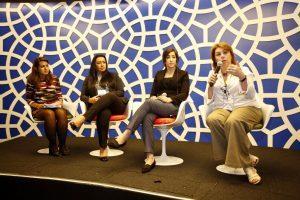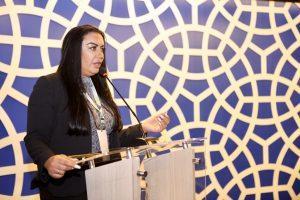(MENAFN- Brazil-Arab News Agency (ANBA)) Isaura Daniel
São Paulo – Consumer and retail habits are changing in the Arab market and bringing new challenges for Brazilian companies interested in selling their products in the region. Experts presented an overview of what's going on in this sector in the Arab countries during a cycle of lectures addressing the subject at theArab Brazilian Chamber of Commerce 's headquarters in São Paulo last Tuesday (12).
Euromonitor Strategic Intelligence for Middle East and North Africa Markets consultant Kinda Chebib (pictured above) was one of the lecturers and talked mainly about digital channels, which has grown as a form of retail in the Arab countries, and the change of points of sale from places of trade to places of experience for consumers.

Experts talked about the Arab consumer
Figures presented by Chebib show that last year 68% of the homes in the Middle East and North Africa (MENA) had smartphones, and this number is expected to reach 85% by 2023. More than a half – 52% – of all digital retail transactions are expected to be made through smartphones or tablets by the next year in the region, the consultant believes. 'More purchases will be made bymobile devices,' Chebib said.
She also said that MENA are the second region with the most multichannel buyers, meaning those who buy through computers, apps, phones and physical stores. Last year, these were 33% of the consumers in the region.
The consultant reported that asignificant growth in digital channels to sell foodstuffs in the Arab countries, such as subscription services and apps for food delivery and groceries shopping, reflects a busier consumer that works long hours but wants to acquire high-quality foodstuffs. Chebib said that the supermarkets in the region have partnered up with apps.
Alessandra Frisso, who's the commercial director at H2R Pesquisas, a research firm specialized in the Arab countries, also addressed how consumption in the region has changed mainly due to the young people. She calls these consumers 'the new normal' – a term that has also been used by foreign experts. 'It's related to these young people who are coming to age and drive change. They're more digital, more connected to the world and stand up for themselves,' Alessandra told ANBA.

Alessandra: Young people change the consumer profile
This new consumer is also related to other changes in the Arab world. 'This region is very dynamic and goes through several changes – not only social but also technological ones, breaking old business patterns such as oil and turning to clean energy. It's a society that has never though about crisis but now tries to save up money,' she describes.
Alessandra presented traits of this new consumer in the Arab countries, who appreciates discounts and rewards programs, is loyal to brands if they have a fair price and high quality and looks for physical stores that remind a showroom in order to get in touch with the product. 'After getting to know the product inside a physical store, the consumer turns to an online multichannel experience. The brands may talk to them regardless of the place,' Alessandra said.
Based on surveys carried out by H2R, Alessandra presented other traits of the consumption in the Arab countries and how the Arabs see Brazil. He pointed out that each country or region has its own cultural code, which reflects on consumption. 'A country's cultural code is all the background that we have, how we learn, what we appreciated, from a car to cuisine, from relationships to brands, and how we evaluate those brands,' she said
Chebib also presented figures about retail in the Arab countries that may be useful for companies to draw a strategy. She said that, in North African countries such as Tunisia and Algeria, most of retail is focused on packaged foodstuffs, while in Gulf countries such as the United Arab Emirates and Saudi Arabia, retail focus mostly in clothing and footwear.

Janaína talked about her experience with Arabs
Minerva Foods exports manager Janaína Azevedo talked about her 23-year experience with the Arab consumer market. Before Minerva, a company that produces mostly beef, the executive had worked with dairies and poultry. She said that a trustful relation is a key priority for the Arabs. Janaína believes in the importance of a close relation to clients. Clients are visited at least once a year. 'Their success is our success too,' she said. The executive said that she learned a lot from working with Arabs, especially in bargaining. 'They like to bargain,' she told the businesspeople attending.
In an interview with ANBA, Arab Chamberpresident Rubens Hannunexpressed satisfaction with how a such strategic subject for companies to break into the Arab market was approached. 'You need to know the consumer, the retail. You need to know the whole context to fit in. And learning how to export products other than commodities to the Arab countries is even more important,' he said. Arab Chamber commercial manager Daniella Ribeiro Leite led the talk between the audience and lecturers.
Translated by Guilherme Miranda
MENAFN1311201902130000ID1099266824
Legal Disclaimer:
MENAFN provides the information “as is” without warranty of any kind. We do not accept any responsibility or liability for the accuracy, content, images, videos, licenses, completeness, legality, or reliability of the information contained in this article. If you have any complaints or copyright issues related to this article, kindly contact the provider above.